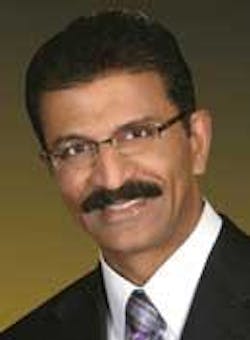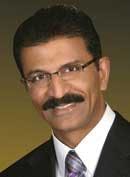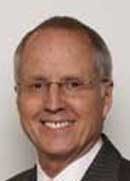The right place at the right time: Dr. Joe Blaes interviews a pair of Scottsdale Center leaders about the economy
For more on this topic, go to www.dentaleconomics.com and search using the following key words: Scottsdale Center, Doug Young, Imtiaz Manji, economy, patient mindset.
Editor's Note: Practice growth expert and CEO of Scottsdale Center for Dentistry, Imtiaz Manji, and renowned lecturer and columnist Doug Young are co-presenters of “Practice Harmony: Design Your Practice, Design Your Life,“ a workshop at the Scottsdale Center. In this interview, they answer questions that are on many people's minds and talk about the upside of the economic downturn.
Dr. Joe Blaes: Let's get right down to it. Imtiaz, you've coached thousands of dentists on their practice economics. What is your take on what's going on right now?
Imtiaz Manji: There's no question: the landscape has changed. As of the end of February, the market had lost about 40% in value, putting us back to 1997 levels. That means people have in effect lost 12 years of their accrued savings, and that's going to upset a lot of retirement plans. At the same time, people are living longer now. When Social Security was introduced in the 1930s, the average lifespan was about 60 years. Now it's more like 80 to 90. You put those two facts together and it adds up to another reality: people are going to be working longer.
The consumer market has also changed dramatically. In 1982 people were saving about 12% of their income. Now they're saving nothing. Their home equity is disappearing — we've got 21 million homes in this country where the value is now lower than the mortgage. So of course that's going to affect consumer behaviors. The numbers we're seeing are telling the story: 70% worried about losing a family member's income this year, 40% reducing spending on luxuries, 10% spending less on necessities. In this environment, anything a patient has to pay out of pocket becomes a luxury in their mind.
Dr. Joe Blaes: Doug, how do these facts change how dentists need to think about their careers?
Doug Young: Given the powerful facts Imtiaz is talking about, the issue becomes all about the mindset you have to have in this new reality. It can't be about “the great escape“ — it's not work, work, work and then stop. You have to think of it in terms of a journey, and the question becomes: “How do I navigate this lifelong journey?“ And the right environment is the key. We call the workshop we deliver together Practice Harmony because that's the way it should feel. Everything should be in harmony in the way you work and the way you live. You want to come to work in a place that supports you and your vision, that works for you instead of the other way around.
This mindset shift won't be easy for some. For a long time dentists have been somewhat insulated from outside economic cycles. Up to now they've been doing fine because a certain level of success in dentistry was natural — you just did your dentistry and took care of your patients and for the most part the economic end took care of itself. In this new landscape, that's all changed. Dentists are going to have to become more aware of how to leverage their opportunities, and they're going to have to go deeper with each patient to get the right results.
Patient mindsets are different, too, as Imtiaz pointed out. A recent poll showed that 73% of respondents were concerned and scared about the economy. But at the same time, 75% said they personally were not affected. So while that means that we have a huge scarcity perception to overcome, the fact is three out of four of your patients have no real economic barriers, just psychological ones. It's that 75% you need to focus on, because those patients are in a position to make the right decisions, if we can show them the right value.
Dr. Joe Blaes: So what can dentists do to overcome these tough realities?
IM: Actually, they don't need to do anything different than what successful dentists have been doing all along — they just need to do it with more focus and intensity during the tough times. Success in dentistry has always come down to two things, and it's these same two things that all dentists have to focus on now in order to compete in this market.
First is the clinical opportunity. Clinical excellence will always be the foundation of a great practice, and now more than ever. No matter where you are in your journey, you have to make an honest appraisal of your skill sets in diagnosis, treatment planning, and clinical delivery. Ask yourself, “If a top clinician were to look in this patient's mouth, would he or she see something I'm not?“ If you want to go deeper with your patients, you have to be able to diagnose and deliver at a higher level.
The other area is what I call the value opportunity. Even if your clinical skills are impeccable, you can't do dentistry unless patients accept treatment. This means that the systems in your practice — everything from the technology you use to the environment you create to how your team is organized and aligned — need to create the right value in the patient's mind.
So by understanding your gaps in these two areas and getting the right support to be able to close those gaps, you can really take an active role in growing your practice in this tough economy. Doug and I talk about this a lot in Practice Harmony, the fact that you have to look at everything — your level of clinical mastery and ability to diagnose comprehensively, your case presentation techniques and patient value experience, your technology and how you use it strategically, and how effectively it's integrated into the practice. It's about creating the right environment that speaks to the value you're trying to represent.
Dr. Joe Blaes: So you think there is actually an opportunity to thrive in this economic environment? What specific opportunities are available to dentists now?
DY: Absolutely. There was an article a while back in Harvard Business Review that found that companies that resisted the urge to cut back and were aggressive about enhancing their core strengths during a downturn not only survived but became leaders in the marketplace after the downturn was over. While others were cutting back and going into survival mode, they were positioning themselves to really move when conditions were favorable again. So historically, there is plenty of evidence of businesses that have done especially well in times like these because they had the foresight to see beyond the curve in the road.
IM: I see several distinct opportunities. There is that awareness opportunity I just mentioned — an opportunity to reexamine how you do things. We're also seeing a window of opportunity right now for actually increasing patient flow, because people are concerned about their coverage ending and want to get all the procedures they can while they can. You should be identifying those patients and expediting their treatment. As for the ones who are avoiding necessary treatment, the sad truth is we know we're going to be seeing them eventually because those conditions won't heal themselves. Third, there is the reinvestment incentive provided by Section 179 of the tax code, which has been extended through 2009 — you're simply never going to find a better time to make equipment and technology investments, so you have to seize this chance while it's here. And all this adds up to a huge competitive opportunity. It's a chance to make your move while others are paralyzed by uncertainties.
Dr. Joe Blaes:Does this mean you would advise someone who is taking a wait-and-see attitude about reinvestment to take the plunge and spend?
DY: They need to ask themselves if their reluctance is based on a sound evaluation of their economics, or if they're reacting to fear. It takes courage to shut out the noise and make that objective evaluation, but you need to really pay attention to your life and your circumstances. That's why it's so important to surround yourself with the right experts who can help you identify your opportunities and coach you through these decisions in a clear, rational way.
Practice Harmony is really about sorting out all of these questions, getting answers from the experts, and taking an objective look at your practice opportunities. It's about restoring that feeling of peace and harmony in the way you think about your practice.
IM: Reinvestment in the practice is part of every long-term growth strategy — regardless of the economy. It makes no more sense to arbitrarily curb spending now than it does to throw money around without consideration when times are good; you have to have the right context and the right information to make the right decision. I would never advise someone to build beyond their means, but if you have the resources, don't be put off by scary news reports — you need those enhancements to your facility and to your clinical abilities to make your move in the marketplace. Now more than ever we're being forced to really look at our businesses under a microscope; if we don't fix what we find, we're going to be playing catch-up for a long time.
There are dentists that Doug and I are coaching at Practice Harmony who are using this economic situation to reinvest and, in some cases, completely reinvent themselves. They're not only going to survive — when the economy picks up, they're going to accelerate. And when that happens, people will say those dentists were lucky, that they were in the right place in the right time. But it's not luck. These are people who are seeing opportunity when others are seeing doom and gloom. They're putting themselves in the right place at the right time.
For more information about Practice Harmony or Scottsdale Center for Dentistry, visit www.scottsdalecenter.com or call (866) 781-0072.


